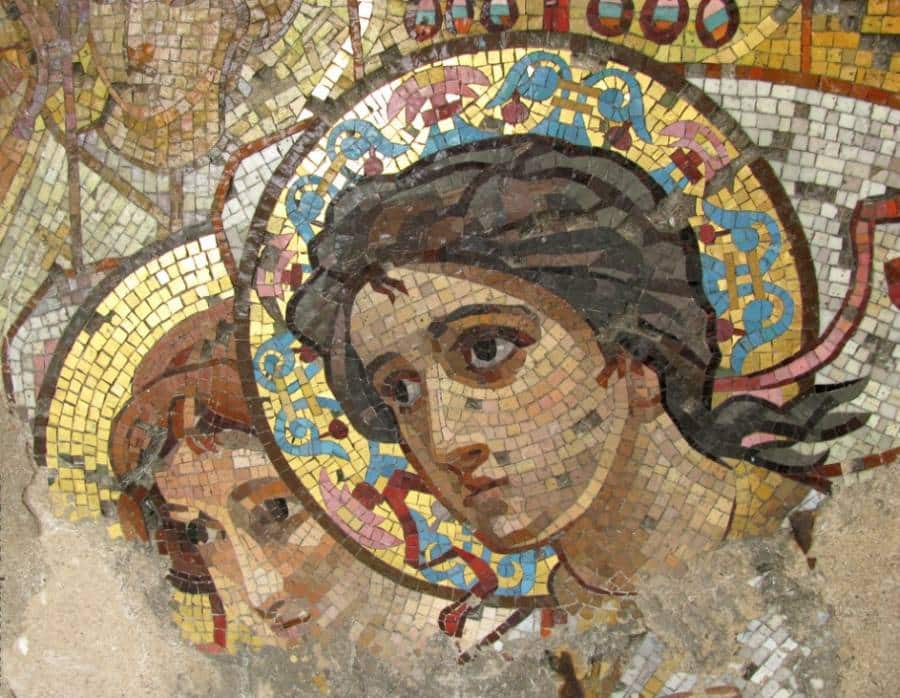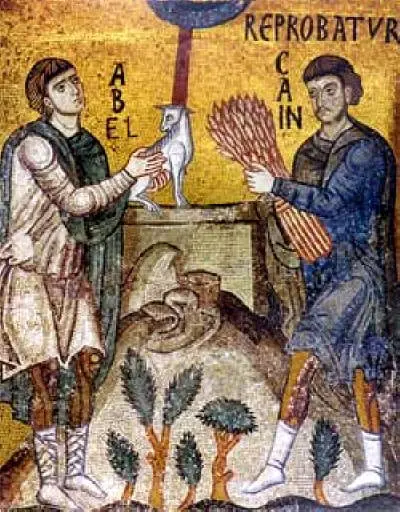Matthew 6:1. Be careful not to do your alms before people so that they can see you: otherwise you will not be rewarded from your Heavenly Father.
The word “look” is the Greek προσέχετε. In the Slavic translation – “listen”. Since there is reason to think that in ancient times this word was used as a signal to warn others from some kind of danger, the word πρόσεχε meant: beware, carefully watch yourself. This is also the main meaning of the corresponding Greek Hebrew word “shamar”, which in the Seventy is transmitted through προσέχειν. Thus, it is more accurate to translate this Greek word in this verse as: beware, beware lest (μή). A further δέ is issued in the Vatican and other manuscripts, but is found in Sinai and others. Some interpreters argue that the presence of this particle in the text is “too little proven.” Chrysostom lowers her. Others say that δέ disappeared only with the passage of time and, moreover, due to a very simple reason, which, if not in discord, then, in any case, in some inconvenience to pronounce the adjacent Greek “te” and “de” (προσέχετε δέ). Some place δέ in brackets, but most of the newest and best commentators defend the presence of this particle either in part or in full. So, Alford, although he himself places δέ in brackets, says that the omission of this particle arose, probably due to the fact that they did not pay attention to the connection of the first verse with the fifth chapter and assumed that a new subject was being discussed here. The importance of the particle is evident from the fact that with the adoption or omission of it, the meaning changes greatly. Christ earlier (Matt. 5) spoke about what true “righteousness” consists of (Matt. 5:6, 10, 20), determined by the true and correct interpretation of the spirit and meaning of the Old Testament law, and that if the “righteousness” of His disciples is not higher than the righteousness of the scribes and Pharisees, then the disciples will not enter the Kingdom of Heaven. Now the Savior begins to illuminate the same subject from other and new sides. In a free translation, the meaning of His words could be conveyed as follows. But if you, He says to the disciples, and achieve the ideal that I told you about before, if you acquire true “righteousness” (according to the translation of some German scholars Frömmigkeit – piety), then beware, however, that this righteousness of yours does not become the object of careful observation by other people. In this paraphrase, as the reader sees, the word “righteousness” is replaced by the word “alms” used in Russian and Slavic translations. This substitution has very solid grounds. First of all, we note that the German and English translations (recepta) agree with the Russian and Slavonic (Almosen, alms). But in the Vulgate, a completely different expression is used – justitiam vestram, corresponding to the Greek διακιοσύνην, meaning “righteousness.”
The question of which word should be used here, “righteousness” or “charity” (διακιοσύνη or ἐλεημοσύνη), has been the subject of painstaking research. Authoritative publishers and interpreters of the New Testament lean in favor of “righteousness.” Such reading has been approved almost unanimously by all eminent publishers and critics. This word is found in the Vatican Code, in Beza, in ancient Latin translations, as well as in Origen, Hilary, Augustine, Jerome and many others, but in Chrysostom, Theophylact and many others – “alms”. Western critics and interpreters have taken the trouble to trace where and why such a replacement came about. Omitting the first “but” or “but” in the first verse, the scribes, as mentioned above, did not pay attention to the connection of the 6th chapter with the previous one and thought that in the 6th chapter a new subject was being discussed. About what? This was shown to them in verse 2, which speaks of “almsgiving.” Since the first verse (with the omission of δέ) serves as an introduction to the second, they thought that the first should also contain a speech about alms, and replaced the word “righteousness” with it. This replacement could have taken place all the more easily and more conveniently because there were certain circumstances that justified it. If the reader takes the trouble to look through the Russian and Slavic Bibles the following passages: Deut. 6:25, 24:13; Ps.23:5, 32:5, 102:6; Isaiah 1:27, 28:17, 59:16; Dan.4:24, 9:16, he will find that in the Slavic text mercy, almsgiving, mercy, pardon are found everywhere, and in Russian – righteousness, truth, justice, and only in one place the Russian text almost agrees with the Slavic, namely, in Ps.23:5 (almsgiving is mercy). Thus, the same texts in Slavic and Russian translations sometimes have completely different meanings. So, for example, in Dan. 4:24 we read in the Slavic text: “atone for your sins with alms,” and in Russian: “atone for your sins with righteousness.” This difference came from the fact that our Slavonic translation was made from the translation of the Seventy, where in the above cases (which we have not indicated all for the sake of brevity) the word ἐλεημοσύνη – almsgiving is used, and Russian – from Hebrew, where the word “tsedaka” is found – righteousness. Question, therefore, arises why the Seventy found it possible to translate the Hebrew “tsedaka” through ἐλεημοσύνη – “almsgiving”, and whether “tsedaka”, meaning “righteousness” proper, in some, at least, cases, also served to express the concept of almsgiving. The answer must be in the affirmative. Righteousness is a tricky word, especially for a simple, undeveloped person it is difficult to understand what it means; it is much easier to understand this word if righteousness takes a more concrete form – mercy, mercy, alms. From here, very early, even before R.X., the word “tsedaka” began to denote alms, which, as was said, probably facilitated the replacement of “righteousness” by alms in the verse of the Gospel of Matthew under consideration (see, for example, Gesenius W. Hebräisches und aramäisches Handwörterbuch über das neue Testament. 17. Auflage, Berlin-Göttingen-Heidelberg, 19 62. S.675, left column – Ed.).
However, this replacement was unsuccessful, and this can be shown on the basis of “internal considerations” (context) when analyzing our place. The meaning of the instruction of this verse is that the disciples do not work their righteousness before people, for show, in order for people to glorify them. From further instructions it is clear that alms should not be given for display, but not only that, and prayer (verse 5 et seq.) and fasting (verse 16 et seq.) should not be ostentatious. If “righteousness” in the verse under consideration is replaced by “almsgiving”, then one might think that it is only one done for show and that Christ rebukes only showy alms, because verse 1 will then be put in closest relation only to verses 2–4. It follows from what has been said that, accepting “righteousness” in verse 1, we must take the word for the designation of a “generic” or general concept that embraces almsgiving, prayer, and fasting. In other words, according to Christ, almsgiving, prayer and fasting serve as an expression of human righteousness. A person distinguished by these virtues can be considered righteous if this righteousness is based on love for God and neighbor. It is necessary that all the virtues that make up righteousness should in no case be used for show. The Greek word used for the latter concept (θεαθῆναι) means staring, prolonged, intense and attentive looking at something, as, for example, is done in the theater, indicates contemplation, in contrast to βλέπειν, which means simply to see, to look, to have the ability to do so. Hence the instruction of the Savior is clear: He teaches His disciples that their “righteousness” should not be the subject of careful observation, scrutiny by other people. Instead of “so that they see you” in Greek “to be seen” (or “to be seen by them, αὐτοῖς, i.e. ἀνθρώποις, to people”, cf. Matt. 23:5). Thus, the first half of this verse would be better translated as: but beware (take care not to do =) to do your righteousness before people for the purpose that it be visible to them (striking to their eyes, subject to their close, long observation).
The further “otherwise” (in the Russian Bible) seems to refer to the words: “there will be no reward for you” and so on. In the original, the meaning is somewhat different: beware … but if you do not beware, then you will not be rewarded, and so on. Those. here, for brevity, a omission is made in the Gospel (cf. Mt. 9:17; 2 Cor. 11:16). Christ does not specify what the reward should be. It is not known whether He means earthly or heavenly reward, or both. Nothing prevents us from understanding here both earthly and heavenly rewards. But instead of the Russian “you will not have”, it should be translated simply “you do not have” (οὐκ ἔχετε), so that the whole expression is this: if you do not beware, then you have no reward from your Heavenly Father.
Matthew 6:2. Therefore, when you do almsgiving, do not blow your trumpets before you, as the hypocrites do in the synagogues and in the streets, so that people may glorify them. I tell you truly, they already receive their reward.
The translation is accurate, and the somewhat ambiguous “they” in the last sentence should, of course, refer not to people in general, but to hypocrites. In the original, ambiguity is avoided by the usual omission of the pronoun before the verbs and by putting the verbs (ποιοῦσιν – ἀπέχουσιν) in the same voices, tenses and moods.
The Jews, more than all other nations, were distinguished by charity. According to Tolyuk, the famous teacher Pestalozzi used to say that the Mosaic religion encourages charity even more than the Christian one. Julian set the Jews to pagans and Christians as an example of charity. While reading the long and tedious Talmudic treatise on charity On the Remnants for the Poor at Harvest (translated by Pereferkovich, vol. I), we come across many petty regulations aimed at ensuring that the poor collect the remnants after the harvest. It was even said that “almsgiving and gratuitous services are equivalent to all the commandments of the Torah.” Questions arose as to whether it is not the same thing not to give alms and to worship idols, and how to prove that alms and gratuitous services protect Israel and promote harmony between him and the Father who is in heaven. Therefore, there is no doubt that the Jews developed charity even at the time of Christ, as evidenced by the mention by Christ himself of the poor and their obvious presence, especially in Jerusalem. There is no doubt that in this charity and the distribution of alms to the poor, the “hypocrites”, whom Christ denounces here, also took part. But the question, “whether they trumpeted before them,” gave much difficulty to both ancient and modern exegetes.
Chrysostom understood the expression: “Do not blow your trumpet” in an improper sense. The Savior “in this metaphorical expression does not want to say that the hypocrites had trumpets, but that they had a great passion for ostentation, ridiculing (κωμωδῶν) it and condemning them … The Savior requires not only that we give alms, but also that we give it as it should be given”. Theophylactus expresses himself in a similar vein: “The hypocrites had no trumpets, but the Lord mocks (διαγελᾷ.) their thoughts, because they wanted to trumpet their almsgiving. Hypocrites are those who appear to be different from what they really are. It is not at all surprising that many of the latest interpreters, in their remarks about these “trumpets”, follow the paternal interpretations just given. “There is nothing left but to understand this expression in an improper sense,” says Tolyuk.
Such opinions are confirmed by the fact that so far, among the Jewish customs, not a single case has been found when “hypocrites”, distributing alms, literally “trumpeted” before themselves.
The English scientist Lightfoot spent a lot of time and effort searching for such or a similar case, but “although he searched a lot and seriously, he did not find even the slightest mention of a pipe when giving alms.” On Lightfoot’s remark, another English commentator, Morison, says that there was no need for Lightfoot “to search so diligently, because it is well known that, at least in the synagogues, when private individuals wished to give alms, trumpets literally could not be used.” This is not enough. It was said that if the “hypocrites” blew their trumpets, then such “boasting” of them (καύχημα) before people would be incomprehensible, and that if they wanted to, they would be able to better hide their bad motives. There are even cases that are opposite to what Christ is talking about. So, for example, about one rabbi, whose charitable work was considered exemplary, it is told in the Talmud that, not wanting to shame the poor, he hung an open bag of alms on his back, and the poor could take from there what they could, inconspicuously.
All this, of course, does not serve as an objection to the gospel text, and is usually not put forward as an objection. However, the concreteness and liveliness of the expression “do not blow your trumpet” and its obvious connection with the subsequent denunciations of the hypocrites, confirmed in fact in the information that has come down to us about their customs (verses 5 and 16), forced us to look for some real, factual confirmation for him. It was found that such customs really existed among the pagans, among whom the servants of Isis and Cybele, begging for alms, beat tambourines. The same, according to the description of travelers, was done by Persian and Indian monks. Thus, among the pagans, the noise was made by the poor themselves, asking for alms. If these facts are applied to the case under consideration, then the expression “do not blow” will have to be interpreted in the sense that hypocrites do not allow the poor to make noise when demanding alms for themselves. But the author who pointed out these facts, the German scientist Iken, according to Tolyuk, himself “honestly” admitted that he could not prove such a custom either among Jews or Christians. Even less likely is the explanation that the words “do not blow”… “are borrowed from thirteen tubular boxes or mugs placed in the temple to collect donations (γαζοφυλάκια, or in Hebrew “chaferot”). Objecting to this opinion, Tolyuk says that the money that fell into these pipes (tubae) had nothing to do with charity, but was collected for the temple; mugs for donations to the poor were called not “chaferot”, but “kufa”, and nothing is known about their shape. But if only in the Gospel of Matthew we meet with the indication that trumpets were used in the deed of doing good, then this does not at all exclude the possibility that this was actually the case. The trumpets were used by the priests in the temple and synagogues, there were “trumpet-shaped” boxes, and therefore the expression “do not trumpet”, having become metaphorical, could have some basis as a metaphor in reality. In the rabbinical treatises of Rosh Hashanah and Taanit, there are many decrees about “trumpeting”, so if the expression of Christ could not be understood in the sense: do not blow before you when giving alms, then it could well be understood as follows: when you give alms, do not blow before you, as hypocrites do on various other occasions. The meaning of the expression – to draw public attention to one’s charity – is completely understandable and does not change at all, whether we consider the expression to be true or only metaphorical. And how can one demand that the Talmud reflect, despite the pettiness of the Jews, all the then Jewish customs with all their numerous interweavings?
(to be continued)
Source: Explanatory Bible, or Commentaries on all the books of the Holy Scriptures of the Old and New Testament: in 7 volumes / ed. A. P. Lopukhin. – Fourth edition, Moscow: Dar, 2009 (in Russian).







